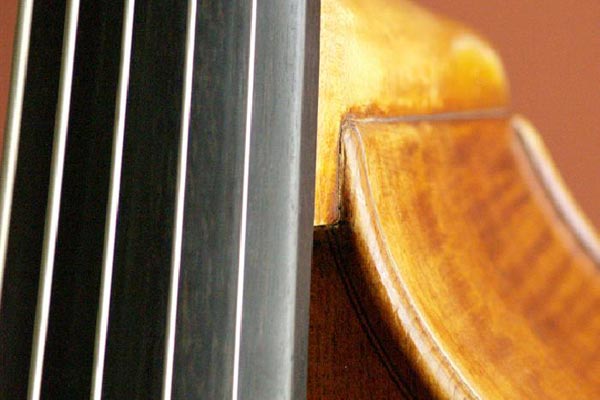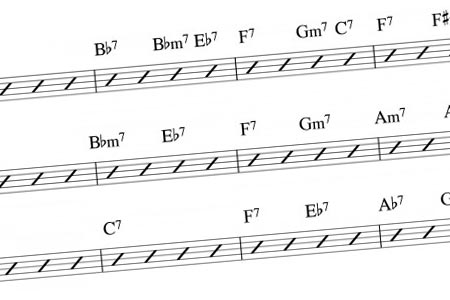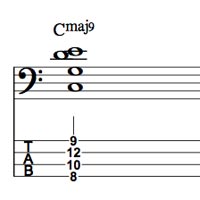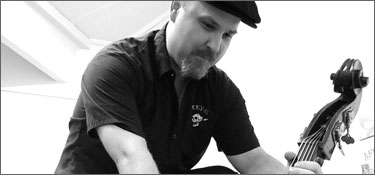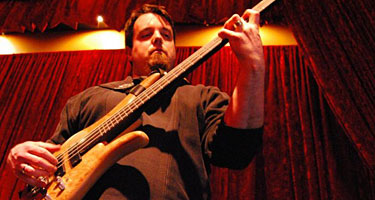Columns: How Tos, Advice & Lessons for Bass Players
Columns - Page 67
Bass Strings: Tips for Finding the Right Sound
This week’s column comes thanks to a question from Maria G. Maria asks: I’m a pretty new player, but I’m not happy with my upright bass strings. I know I need something different, but there are so many different kinds of strings out there I don’t know where to start. They are also expensive (!) so I can’t really experiment...
Exploring Turnarounds
Q: I really enjoy and find great value in your columns on No Treble. In your last column, you discussed the modal and chordal approaches and mentioned this: “Don’t forget to also practice and transcribe things, which will make you a stronger bassist (walking, common endings and turnarounds, time, various time-feels, and so on.)” Could you expound further on what...
Learning the Song – Part 1: Breaking It Down for Performance
It’s time for a real life gig story. I was recently given a set list for an upcoming gig… two sets, roughly 25 tunes, mostly classic rock and soul. Glancing over the set list, I saw many tunes that I already knew, so I figured I’d be fine, right? Guess again. As it turns out, a couple of the tunes...
Playing Chords: A Guide for Bassists
Q: I recently bought a 6-string bass and started working on playing chords. How should I voice more complex chords (e.g. Gm13) using few (3 to 4) notes, while maintaining the quality of the chord? A: It is important to note a few things when doing this. Much of this is learned by doing it wrong and having someone correct...
Audition and Performance Preparation: Recording Yourself
One very enlightening way to prepare for an audition or performance is to record yourself prior stepping on the stage, or into the audition room. Expensive equipment is not required to gain benefit from recording yourself. Although better recording equipment means you can listen back in greater detail, the fact is that free recording software and the microphones on most...
To Effect or Not to Effect? A Discussion for Bassists
Q: What’s your take on effects pedals? Do you use any? A: I have been exploring many different pedals and having fun with the sonic possibilities, though I rarely use them outside of my home. My most used pedal is my reverb pedal, because I like the what it offers when playing in small group settings (a piano trio, for...
Treat Yourself to Some Inspiration
As artists, we are constantly on the search for one thing: inspiration. Inspiration fuels our art, influences our style, and pushes us to perfect our craft. It’s what keeps us learning bass line after bass line, way into the wee hours of the morning, and it persuades us to call one drummer over another. It also pushes us to look...
Choosing the Right Webcam in the Youtube Era
Q: I am looking at starting a Youtube channel, and I was wondering what you’d suggest for a webcam solution. I’m looking for one that has good audio. Alternatively, what is the best, cheap USB interface to buy? A: As many of you may know, I could stand to focus a little attention to my production values with my own...
Bass Technique: Shifting and the Feeling of Lightness
Accurate shifting is extremely important on an upright bass. It may even be the one technique we use the most often. Most other string instruments can play a few two-octave scales without shifting, while we can play a grand total of zero, even if we “pivot.” Despite how often we must execute flawless shift, for many it is a point...
Following the Singer: A Guide to Dealing with Rhythmically Challenged Vocalists
Q: What do you recommend when you’re tasked with accompanying a seriously rhythm-challenged vocalist? I was both music director and bassist for a recent musical review, with our band backing up a variety of vocalists. Two talented singers passed the audition with their carefully prepared selections, but with new show music, we discovered some serious rhythm challenges. Personnel changes were...
Ear Training and the iTunes Game
As a musician, our greatest tool is our ears. Our job within a musical context is to listen, and quite frankly, to play notes that sound good. As a bass player, we need to be on our toes and quickly decipher the bass line and at the very least, the root notes of the chords that are being played. There...
From Groove to Changes to Soloing: Damian Erskine’s Practice Routine
Q: You answer a lot of questions to help bassists out. But I’d like to know, what are you personally working on to improve your playing? A: I am in a constant state of flux with my practice habits. Different things bug me about my playing depending on the gigs I have one week versus the next. Lately, it has...
